
COKE AND CHEMISTRY
Scope & Guideline
Bridging Theory and Practice in Coke Production
Introduction
Aims and Scopes
- Coke Production Techniques:
Research focused on various methods and technologies for producing coke, including advancements in traditional coking processes and the development of alternative production methods. - Chemical Properties and Reactions of Coal and Coke:
Studies that explore the chemical characteristics of different coal types, the reactions that occur during coking, and the resulting properties of the produced coke. - Environmental Impact and Sustainability:
Investigations into the environmental implications of coke production, including emissions control, waste management, and sustainable practices to reduce the carbon footprint of coking plants. - Innovative Analytical Techniques:
Application of advanced analytical methods such as spectroscopy and thermogravimetric analysis to evaluate the quality of coke and the behaviors of coal under various processing conditions. - Market Trends and Economic Analysis:
Research that examines the global market dynamics of metallurgical coal and coke, economic assessments of production processes, and the implications of market fluctuations on the industry.
Trending and Emerging
- Advanced Material Research:
A growing focus on the development of new materials derived from coke and coal, including nanomaterials and composites that enhance performance in various applications. - Hydrogen Production and Utilization:
An increasing number of studies are dedicated to the production of hydrogen from coke oven gas and its potential applications, reflecting a shift towards cleaner energy alternatives. - Digital Technologies and Automation:
Research exploring the integration of digital technologies, such as machine learning and automation, in optimizing coking processes and improving operational efficiency. - Waste Valorization and Circular Economy:
Emerging themes around the recycling of coal and coke byproducts into valuable materials, emphasizing the principles of the circular economy and sustainable resource management. - Health and Safety in Coking Processes:
Heightened emphasis on health and safety measures within coking operations, focusing on reducing occupational hazards and improving worker safety protocols.
Declining or Waning
- Traditional Coal Utilization Methods:
Research on classical coal utilization techniques, which have seen a reduction in interest as newer, more efficient technologies and methods are developed. - Basic Environmental Assessments:
Studies that provide general environmental assessments without robust quantitative data or innovative strategies are becoming less prominent in favor of more detailed, data-driven analyses. - Low-Impact Coking Processes:
The exploration of low-impact or less efficient coking processes is waning, as the industry shifts towards more sustainable and technologically advanced methods.
Similar Journals

ACTA CHIMICA SINICA
Elevating Chemical Research Standards GloballyACTA CHIMICA SINICA, published by SCIENCE PRESS, is a distinguished peer-reviewed journal in the realm of Chemistry, specifically focusing on general and miscellaneous chemistry fields. Since its inception in 1982, the journal has consistently contributed to the advancement of chemical research in China and beyond, maintaining a reputable standing within the academic community, evidenced by its 2023 Scopus ranking of #197 out of 408 in its category. With a current impact factor placing it in the Q3 quartile, ACTA CHIMICA SINICA aims to disseminate innovative research findings, covering a wide spectrum of topics within the discipline. Although it is not an open-access journal, it offers various access options through institutional subscriptions, ensuring that its high-quality content is available to a broad audience. Researchers, professionals, and students alike will find this journal a vital resource for keeping abreast of developments in the field and for contributing their own findings to an engaged scientific community.
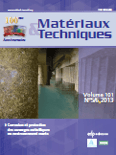
Materiaux & Techniques
Pioneering Research in Material Development and ApplicationMateriaux & Techniques, published by EDP SCIENCES S A, is a prominent journal in the field of materials science, specifically focusing on diverse and innovative techniques in material development and application. With an ISSN of 0032-6895 and an E-ISSN of 1778-3771, this French journal serves as a key resource for researchers and professionals looking to advance their knowledge and share their findings within the community. The journal holds a Q3 ranking in Materials Science (miscellaneous), indicating its role in contributing to various facets of material science research amidst a growing field. Despite operating under a traditional access model, it provides a platform for rigorous peer-reviewed studies and significant advancements in material technology. With a publication history tracing back to the late 1970s and extending through to 2024, Materiaux & Techniques continues to uphold its commitment to fostering high-quality discourse and innovation in materials science.

Applied Chemistry for Engineering
Empowering Engineers with Applied Chemistry InsightsApplied Chemistry for Engineering, published by the Korean Society of Industrial and Engineering Chemistry, is a vital resource for researchers and professionals engaged in the realms of chemical engineering and applied chemistry. With an ISSN of 1225-0112 and an E-ISSN of 1228-4505, this journal serves as a platform for innovative research that spans diverse applications within these fields. Although currently not classified under open access, it provides critical insights and advancements to its audience, contributing to the ongoing discourse in the industry. The journal's significance is underscored by its rankings in Scopus, where it resides in the Q4 category for both Chemical Engineering and Chemistry, evidencing its commitment to publishing relevant studies despite its emerging status. As it continues to grow through the converged years from 2007 to 2024, Applied Chemistry for Engineering aims to bridge the gap between theoretical research and practical engineering solutions, making it an essential tool for students, researchers, and professionals alike.

Ovidius University Annals of Chemistry
Empowering Chemical Sciences Through Open Access.Ovidius University Annals of Chemistry is a prominent open-access journal dedicated to the field of chemistry and chemical engineering, published by OVIDIUS UNIV PRESS since 2012. With its ISSN 1583-2430 and E-ISSN 2286-038X, this journal seeks to foster innovative research and disseminate knowledge across diverse chemical disciplines. Situated in the vibrant academic setting of Ovidius University in Constanta, Romania, this journal receives contributions from a global pool of researchers, enhancing its relevance in the international scientific community. The open-access format ensures that all published articles are freely available, promoting a wider reach and impact of the research dissemination. As a valued resource for academics, industry professionals, and students alike, the Ovidius University Annals of Chemistry plays a crucial role in advancing the understanding of chemical sciences and engineering practices.
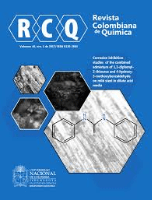
Revista Colombiana de Quimica
Empowering Chemistry through Open Access Knowledge.Revista Colombiana de Quimica, published by the Universidad Nacional de Colombia, Departamento de Química, is a distinguished open access journal that has been serving the chemistry community since 1971. With an ISSN of 0120-2804 and an E-ISSN of 2357-3791, this journal presents a platform for researchers, professionals, and students to share and disseminate their findings in the field of chemical sciences. Positioned in the Q4 quartile in the 2023 rankings, this journal focuses on a diverse spectrum of topics within general chemistry, cultivating a rich discourse among scholars and practitioners in Colombia and beyond. Although the journal currently ranks 294 out of 408 in the field, its commitment to open access research ensures that valuable scientific knowledge is accessible to a wider audience, thus facilitating collaboration and advancement in the chemical sciences. As it converges from 2008 to 2022, the Revista Colombiana de Quimica remains a vital resource for anyone looking to contribute to or stay abreast of developments in chemistry.
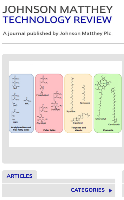
Johnson Matthey Technology Review
Connecting innovators in metals, alloys, and process chemistry.Johnson Matthey Technology Review is a premier open access journal published by Johnson Matthey Publishing Ltd, dedicated to advancing research and innovation in the fields of Electrochemistry, Metals and Alloys, and Process Chemistry and Technology. Since its transition to open access in 2014, the journal has provided a platform for scholars and industry professionals to share their findings and insights in a rapidly evolving field. Based in the United Kingdom, this journal has garnered significant attention, achieving impressive rankings such as Q3 in Electrochemistry and Q2 in Metals and Alloys, reflecting its growing impact within the scientific community. With a commitment to promoting high-quality, peer-reviewed research, the Johnson Matthey Technology Review plays a vital role in connecting researchers, facilitating knowledge exchange, and fostering collaboration across disciplines, making it an essential resource for anyone involved in material science and chemical engineering.

Environmental Chemistry Letters
Empowering the next generation of environmental scientists.Environmental Chemistry Letters, published by Springer Heidelberg, stands at the forefront of interdisciplinary research within the field of Environmental Chemistry. Since its inception in 2003, this esteemed journal has provided a dynamic platform for the dissemination of innovative studies and groundbreaking findings, contributing significantly to the understanding of chemical processes affecting the environment. With an impressive impact factor and ranking third out of 147 journals in Environmental Chemistry (98th percentile as per Scopus), it consistently attracts high-quality submissions from researchers around the globe. The journal maintains a Q1 category rank as of 2023, underscoring its prominent position in scholarly discourse. Environmental Chemistry Letters is dedicated to advancing knowledge on contemporary environmental issues, fostering solutions to mitigate chemical pollution, and promoting sustainable practices across various sectors. Researchers, professionals, and students alike will find invaluable resources within its pages as it continues to illuminate the path toward environmental sustainability.
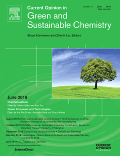
Current Opinion in Green and Sustainable Chemistry
Fostering Collaboration for Sustainable Chemical PracticesCurrent Opinion in Green and Sustainable Chemistry, published by Elsevier, is a premier journal dedicated to exploring the rapidly evolving field of green and sustainable practices in chemistry. With an impressive Q1 ranking in multiple categories, including Catalysis, Process Chemistry and Technology, and Waste Management, this journal plays a pivotal role in disseminating innovative research by providing critical insights into sustainable methodologies and their implementation across various industries. The journal aims to gather leading perspectives from experts to facilitate knowledge exchange that drives the global transition towards more sustainable chemical practices. Based in the Netherlands, Current Opinion in Green and Sustainable Chemistry emphasizes high impact, evidenced by its Scopus ranks, notably achieving the 10th percentile in Environmental Science Management, making it indispensable for researchers and professionals keen on advancing sustainable chemistry solutions. This journal offers a blend of open access articles and subscription-based content, ensuring a wide reach and engagement with its audience.
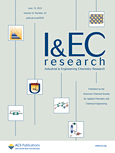
INDUSTRIAL & ENGINEERING CHEMISTRY RESEARCH
Innovating Solutions for Tomorrow's Industrial ChallengesINDUSTRIAL & ENGINEERING CHEMISTRY RESEARCH, published by the American Chemical Society, is a pivotal journal that disseminates high-quality research in the fields of Chemical Engineering, Chemistry, and Industrial and Manufacturing Engineering. With an impressive impact factor, this journal ranks in the top quartile (Q1) across multiple categories, reflecting its significance and influence within the scientific community. Since its inception in 1987, IECR has provided a platform for researchers, professionals, and students to publish innovative findings that advance the understanding and application of engineering chemistry. Though it operates under a subscription model, the journal continues to foster collaboration within the field, inviting contributions that span theoretical advancements, experimental studies, and practical applications. Whether you are engaged in academia or industry, IECR serves as a vital resource for staying abreast of the latest developments in chemical and engineering research.
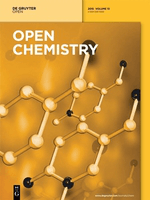
Open Chemistry
Illuminating the Path of Chemical InnovationOpen Chemistry, published by DE GRUYTER POLAND SP Z O O, is a distinguished peer-reviewed journal that has been serving the global chemistry community since its inception. With an ISSN of 2391-5420 and an E-ISSN also of 2391-5420, this open-access journal has been accessible to researchers and practitioners alike since 2015, ensuring a wide dissemination of high-quality research findings. Located in Germany, specifically at BOGUMILA ZUGA 32A STR, 01-811 WARSAW, MAZOVIA, POLAND, Open Chemistry aims to publish innovative research across various chemical disciplines, with special attention to miscellaneous chemistry and materials chemistry. It is currently ranked in the Q3 category for both fields as of 2023, reflecting its solid standing within the academic community, with specific ranks of 187/408 in General Chemistry and 153/317 in Materials Chemistry, corresponding to respective percentiles of 54 and 51. Open Chemistry not only enhances the accessibility of cutting-edge research but also serves as a vital resource for students, professionals, and scholars seeking to advance their knowledge in the rapidly evolving landscape of chemical sciences.